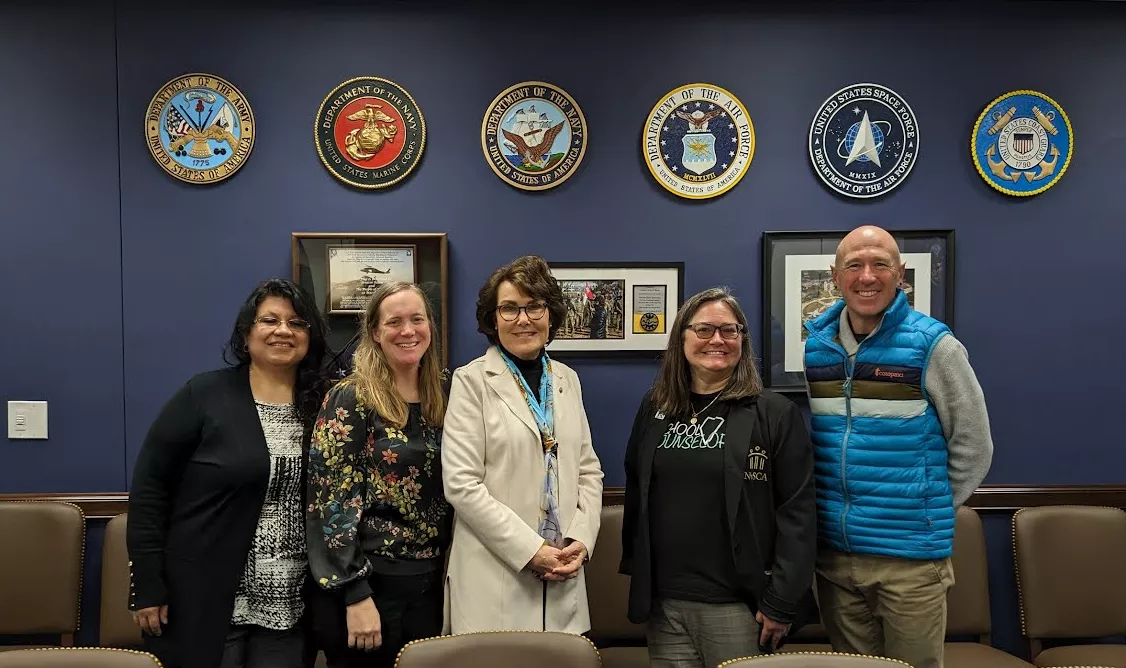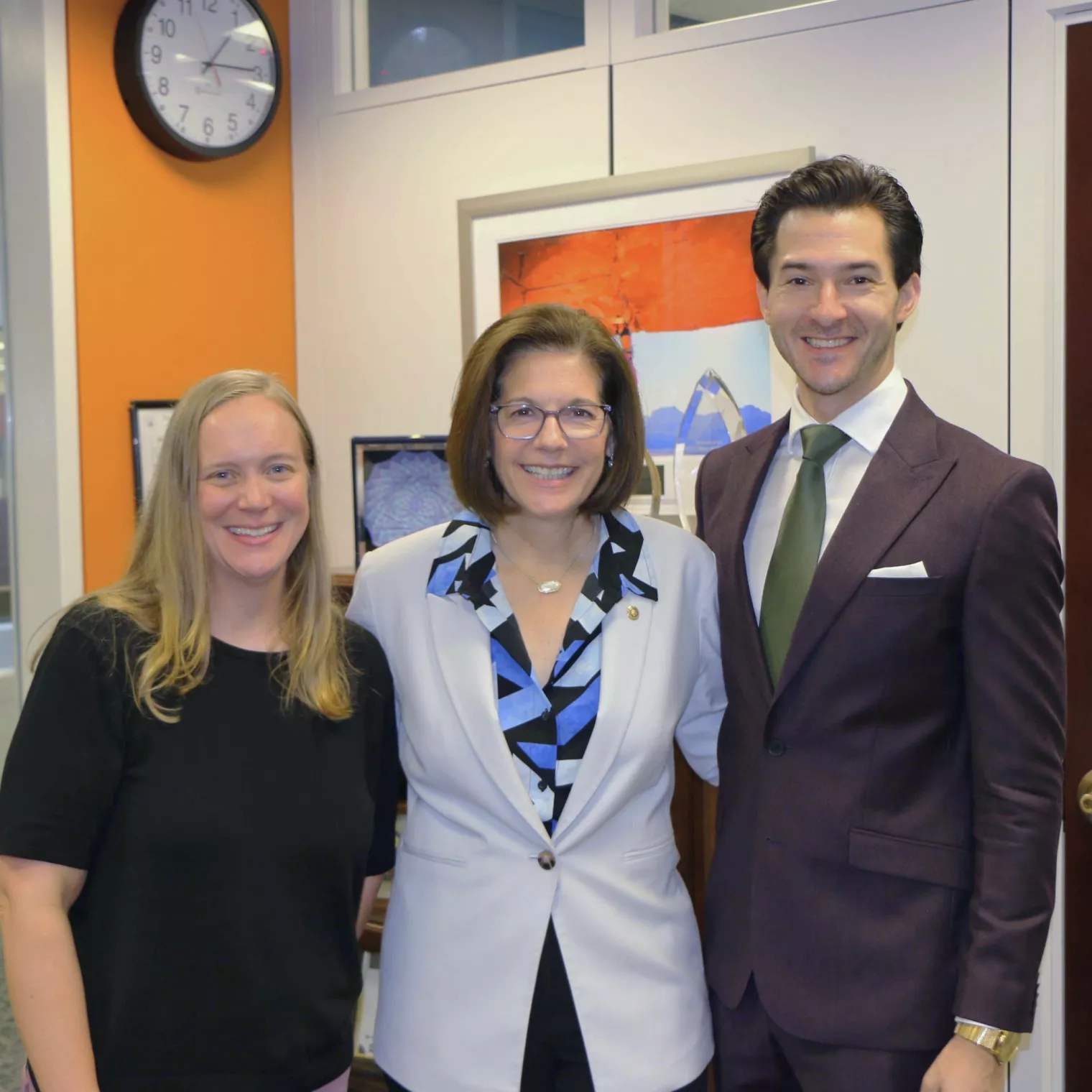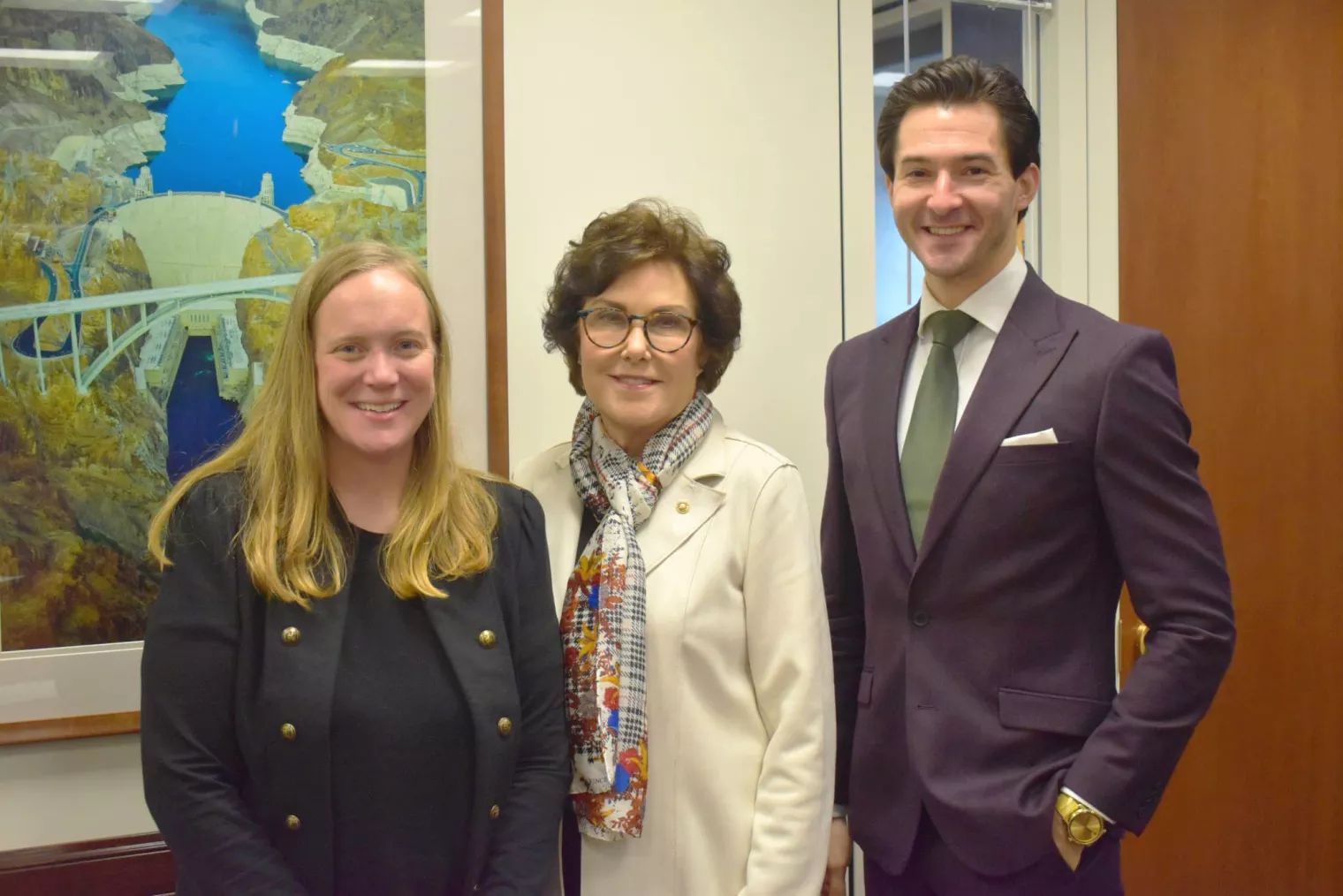NEA Director Report
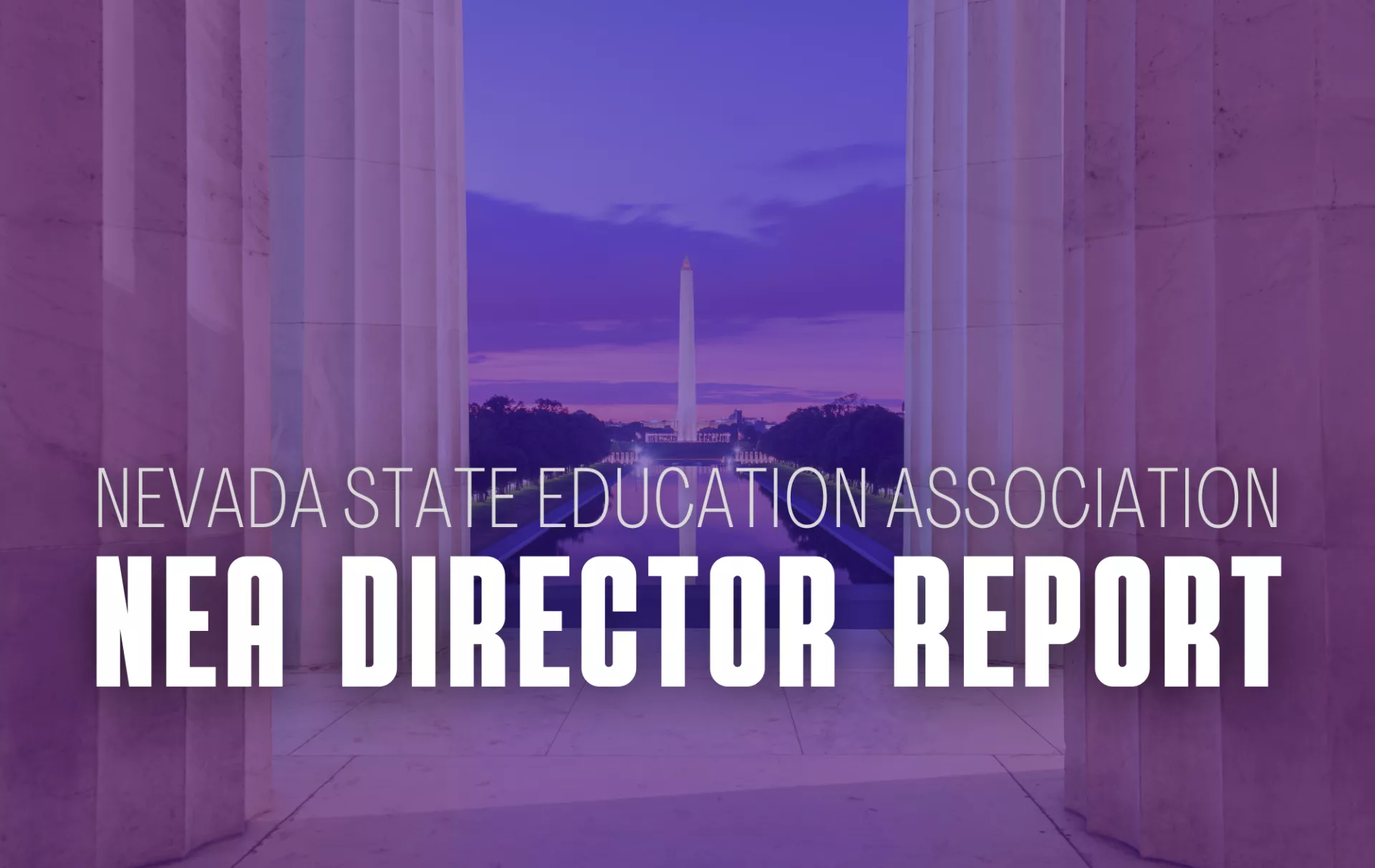
October 9, 2025 Report
In October, I visited with the staff members of all six federal representatives for Nevada: Susie Lee, Dina Titus, Mark Amodei, Steven Horsford, Jacky Rosen, and Catherine Cortez Masto.
The lobby topics included:
IDEA FULL FUNDING
When Congress passed the Individuals with Disabilities Education Act (IDEA), it promised the federal government would pay 40 percent of excess special education costs. A half-century later, students are still waiting for that promise to be kept. The federal share has never come close to 40 percent—it’s currently less than 12 percent. The IDEA shortfall in the 2023-24 school year was nearly $39 billion. The failure to fund IDEA fully has shifted costs to states and school districts, forcing them to choose between raising taxes, cutting critical services, or diminishing opportunities and programs for all students by redirecting general education funds.
ESP PRIORITY BILLS
Asking each representative to cosponsor the Paraprofessionals & Education Support Staff Bill of Rights Resolution (S. Res. 158/H. Res. 297) and other priority bills to recognize the central—and vital—roles played by education support professionals (ESPs). ESPs transport students, keep schools and grounds safe and clean, prepare and serve healthy meals, and perform other functions vital to student learning. Yet one-third of ESPs make $25,000 or less a year, 10 percent must rely on food assistance, and 10 percent have Medicaid coverage. I asked our representative to cosponsor the ESP, PARAPROFESSIONAL, AND EDUCATION SUPPORT STAFF FAMILY LEAVE ACT (S. 2738/H.R. 5222), reintroduced by Sen. Tammy Duckworth (D-IL) and Rep. Sean Casten (D-IL), which would expand the Family and Medical Leave Act to cover more education support professionals who do not meet current eligibility requirements. When ESPs and school support staff or their loved ones are ill, they should not have to choose between taking care of their needs or keeping their jobs.
SHUTDOWN
This shutdown didn’t need to happen. This is nothing more than a dangerous and disastrous excuse to continue giving handouts to billionaires while driving up costs and stripping away health care from working people and middle-class families.
BOARD MEETING HIGHLIGHTS
We voted to use contingency funds to implement 2025 Representative Assembly-approved New Business Items.
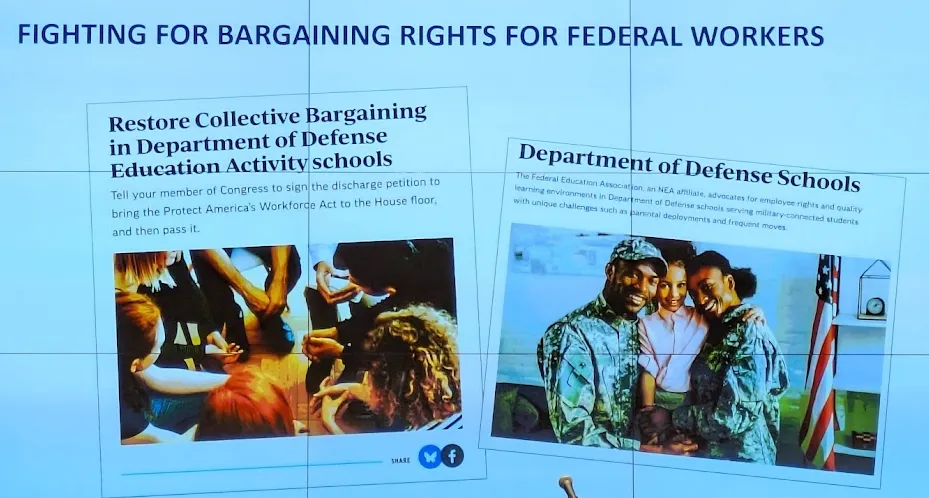
Check out the NEA Professional Excellence Portal to find classes such as Social Media and the First Amendment.
TRAINING ON AUTHORITARIAN OVERREACH
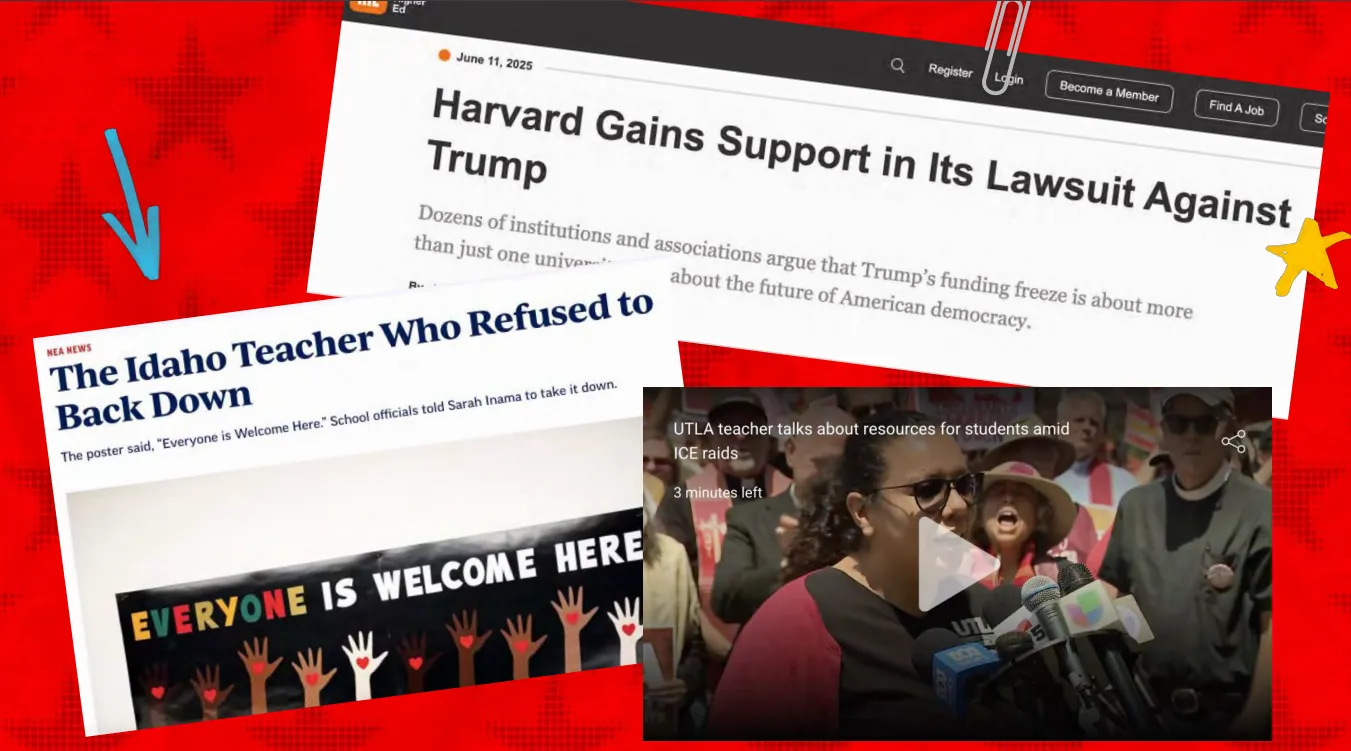
May 17, 2025 Report
Donate to the PAC
The NEA PAC is fueled by educators like you and our mission is to ensure we have leaders at the federal and state level who will fight for students and public schools. Donate to the NEA PAC today to help elect pro-education candidates up and down the ballot.
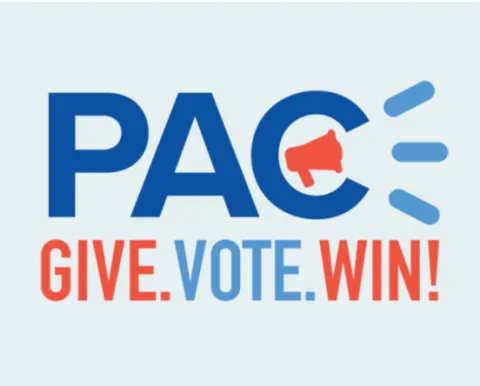
Here is a link to my NEA Director PAC donation page, if you think your members just want a quick place to donate to the NEA Fund for Children.
Lobby Meetings
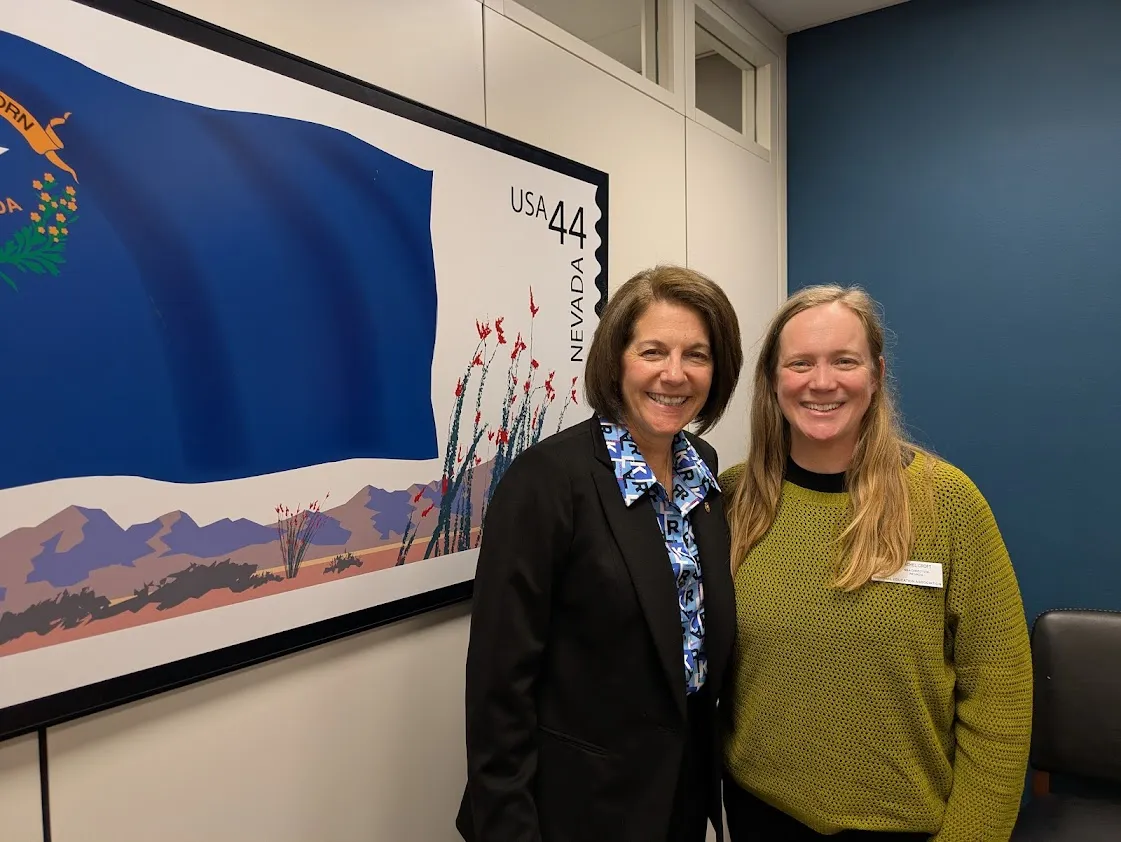
In May, I engaged in discussions with the staff members of all six federal representatives for Nevada: Susie Lee, Dina Titus, Mark Amodei, Steven Horsford, Jackie Rosen, and Catherine Cortez Masto. I worked with Congresswoman Titus’ staff to garner support from NEA for the congresswoman’s bill to support School Nurses. Congressman Horsford also has requested support for his Securing Continued Healthcare for Our Operations and Logistics Professionals (SCHOOL Professionals) Act.
The lobby topics included:
-
TAX CREDIT VOUCHER SCHEME - We expect a push for a voucher scheme modeled after the Educational Choice for Children Act, which would divert $100 billion in taxpayer dollars to private and religious schools. Vouchers weaken public education, especially in rural areas where public schools are economic centers. Special needs students who attend private schools lose important legal rights and protections.
-
MEDICAID & CHIP- Medicaid and the Children’s Health Insurance Program (CHIP) cover 80 million Americans, including 38 million children and 1 in 10 education support professionals. Medicaid helps pay for school-based services that benefit the entire student population. Slashing federal support for Medicaid would not lower costs—it would merely shift them to states. Health care providers are in short supply in rural areas, and many hospitals have closed or no longer offer essential services like maternity care—problems slashing Medicaid support would make worse.
-
SCHOOL MEALS & SNAP - Cutting Supplemental Nutrition Assistance Program (SNAP) benefits would shred the safety net and limit students’ access to school meals. SNAP is the first line of defense against hunger for 42 million Americans, including 20% of our children and 10% of education support professionals. When families lose SNAP benefits, their children lose automatic eligibility for school meals. Community Eligibility Provision (CEP) cuts would affect 12 million students in 24,000 schools.
-
EDUCATION FUNDING - The administration has already made targeted cuts in funding for diversity, equity, inclusion, and accessibility. More and broader cuts are coming. Our students will pay the price. We expect a push to slash and repurpose Title I and IDEA funding as block grants that can be used for vouchers and deprive students with disabilities of important rights and protections. More than 30 million students would be affected nationwide.
-
SECURE RURAL SCHOOLS - The Secure Rural Schools (SRS) program provides crucial funding for public schools, roads, and other public services in rural areas across America. 20% of America’s students attend rural schools. The educator shortage is particularly severe in rural areas due to recruitment and retention challenges. Failure to provide funding would harm rural students, as well the towns and small cities where they live.
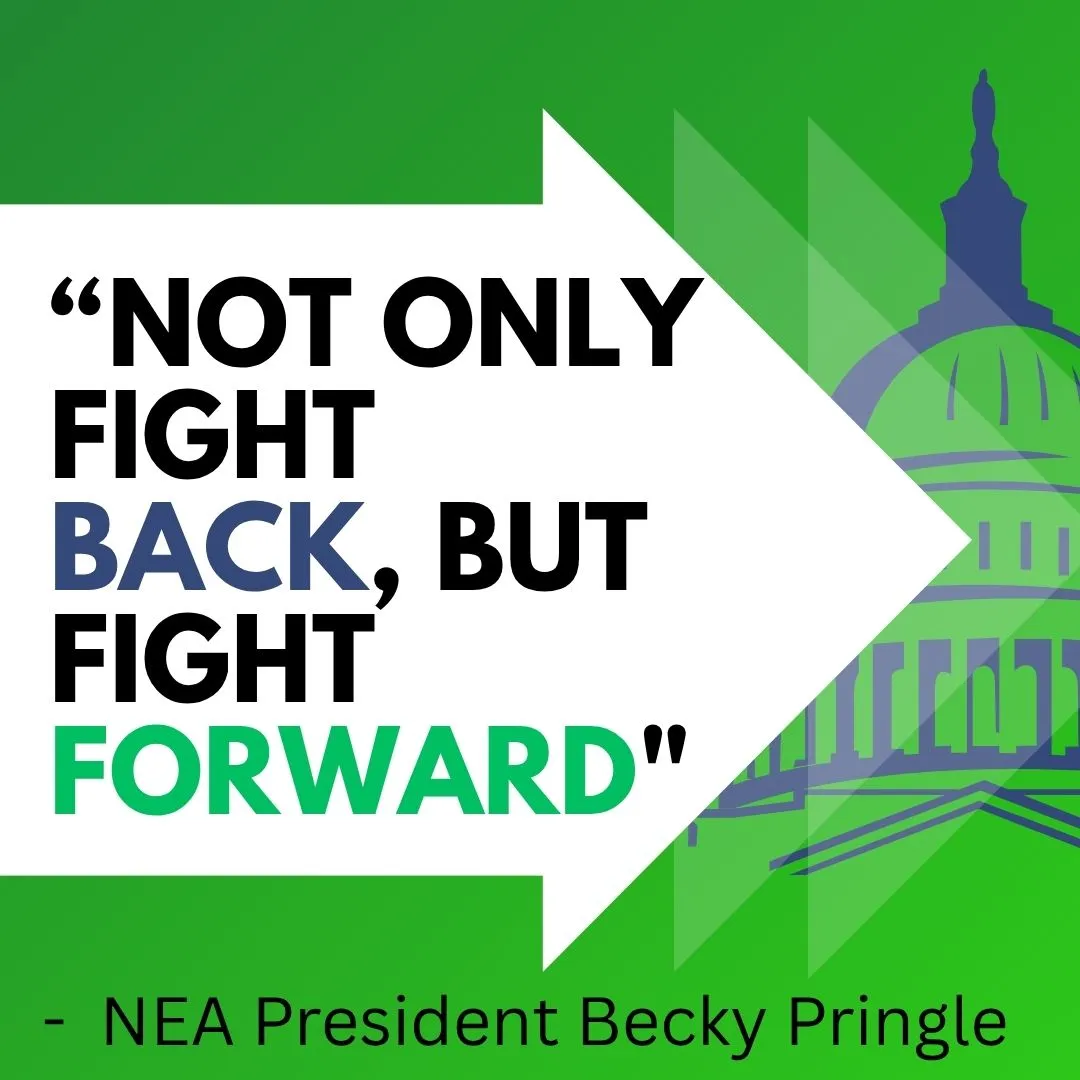
Board Meeting Highlights
To begin the meeting, I shared the mission statement of the NEA - Our mission is to advocate for education professionals and to unite our members and the nation to fulfill the promise of public education to prepare every student to succeed in a diverse and interdependent world.
Some of the benefits we get from NEA is advocacy in Washington DC.
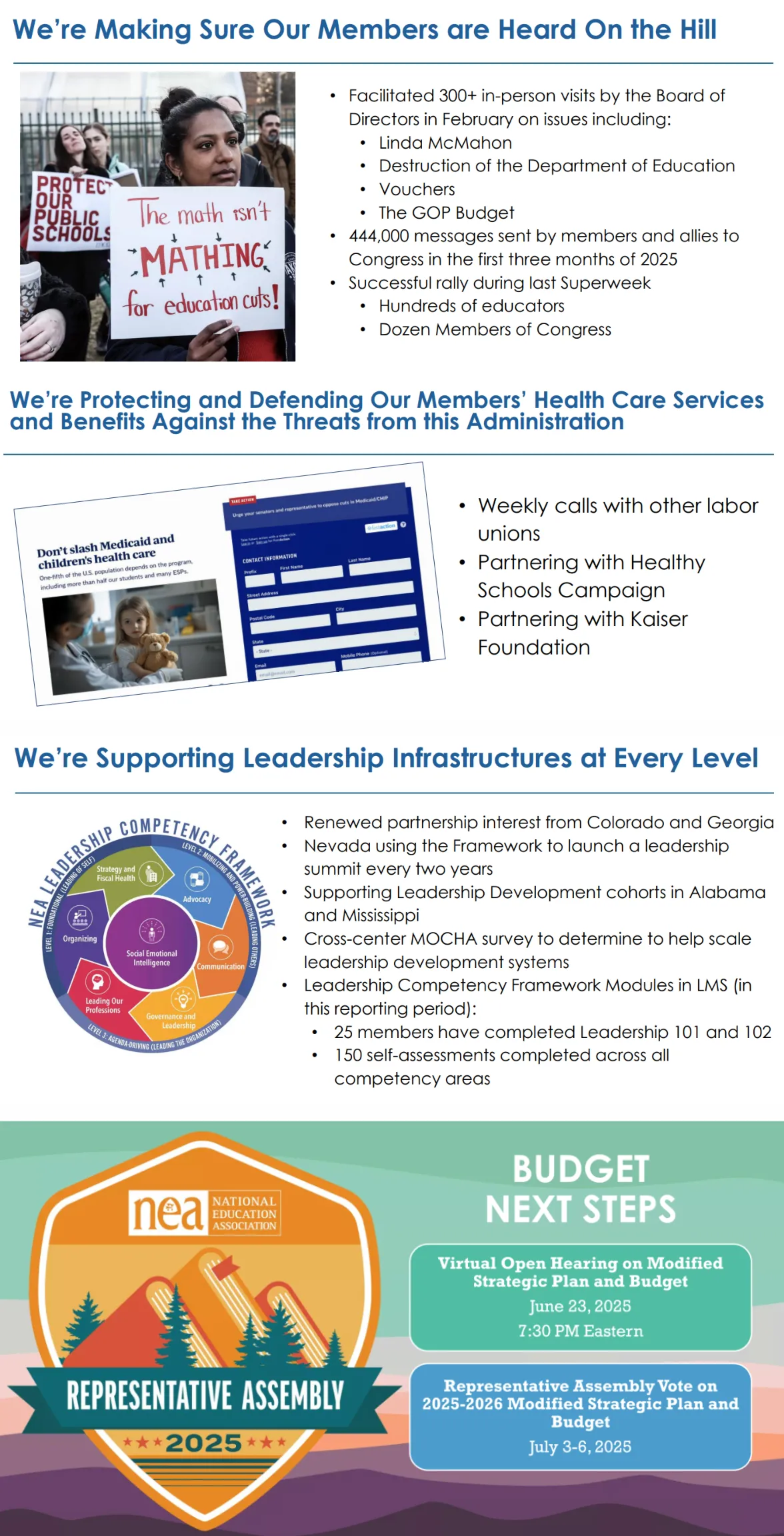
Representative Assembly - As the 2025 RA approaches, please see this traveler safety document. It’s a great reminder not only for RA attendees but also for anyone traveling for NEA conferences.
The board has recommended dues increases for Active ESP and Teacher members. Secretary Treasurer Noel Candelaria encouraged the Board to review his full report online, along with NEA’s strategic goals and vision, at nea.org/budget.
ESEA was mentioned in the Organizing and Membership Report. For the past few months, staff at Chaparral High School in Las Vegas, NV, have been fighting an Assistant Principal who has bullied staff and displayed favoritism. Education Support Professionals (ESPs) and certified staff stood together in solidarity to demand change. In collaboration with ESEA, workers coordinated marches on the Assistant Principal and Principal’s office, gathered over 100 signatures on a petition, spoke at school board meetings, and made three appearances on local TV. ESEA President Jan Giles attended the marches and spoke at the most recent school board meeting, demanding an end to the hostile work environments. The fight continues to this day. Educators are planning an action outside the school in April.
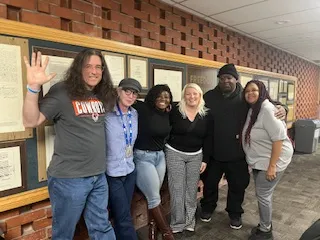
Scott Johnson, Teacher; Theodora Geanekoplos, NEA Organizational Specialist; Danielle Carter, Attendance Officer; Liz Davis, Learning Specialist; Jeff Barnes, Campus Monitor; and Sonja Palmer, ESEA UniServ Director after the Clark County School District Board meeting.
Executive Director Kim Anderson Outlines Strategy to Defend Public Education
NEA Executive Director Kim Anderson delivered a strategic report highlighting both the urgency and opportunity facing public education advocates. Her message focused on combating harmful political agendas while mobilizing members around shared values and coordinated action.
Anderson emphasized that authoritarian regimes often employ tactics such as chaos, control, cruelty, corruption, and consolidation of power to dismantle democratic institutions. She contrasted those tactics with NEA’s commitment to community, courage, and collective action. Civic engagement, she explained, must be rooted in both courage and civility. She referenced a town hall in Iowa with Senator Chuck Grassley as a “masterclass in civil discourse,” where citizens held decision makers accountable by asking direct yet respectful questions.
The report outlined four key goals: to promote, protect, and strengthen public education, and to strengthen the union by organizing for power. Anderson issued a challenge to engage at least 20% of NEA members—approximately 560,000 educators—in proactive civic action. “History shows that educators play an outsized role in educating the public on what is at stake,” she noted. “It’s a big goal, but we can meet it.”
Board Members were encouraged to visit nea.org/protect and nea.org/federalfunding for daily updates and resources. Anderson asked members to consider how the loss of a single federal program might impact their school community and urged them to prepare now for potential future funding cuts. “The harm hasn’t ripened yet,” she warned. “We need to get ahead of it.”
Organizing tools like mobilize.us were also recommended for members to find or host local advocacy events. Anderson concluded with a preview of upcoming national actions aimed at engaging both NEA members and the broader public:
-
Teacher Appreciation Week: May 5–9
-
NEA Town Hall for GOP Public Education Allies: May 14
-
House Parties for Growing Understanding: May–June
-
Teach Truth Day of Action: June 7
-
National Day of Defiance (Indivisible Events): June 14
-
RA Organizing Actions: TBD
February 15, 2025 Report
LOBBY MEETINGS
In February, I engaged in discussions with the staff members of all six federal representatives for Nevada: Susie Lee, Dina Titus, Mark Amodei, Steven Horsford, Jackie Rosen, and Catherine Cortez Masto. I want to thank the February Lobby team for helping me to bring issues to the attention of our federal representatives. Thank you to Erica Nungaray, Andrea DeMichieli, Brian Wallace, and the 2024 NV Teacher of the Year, Laura Jeanne Penrod.
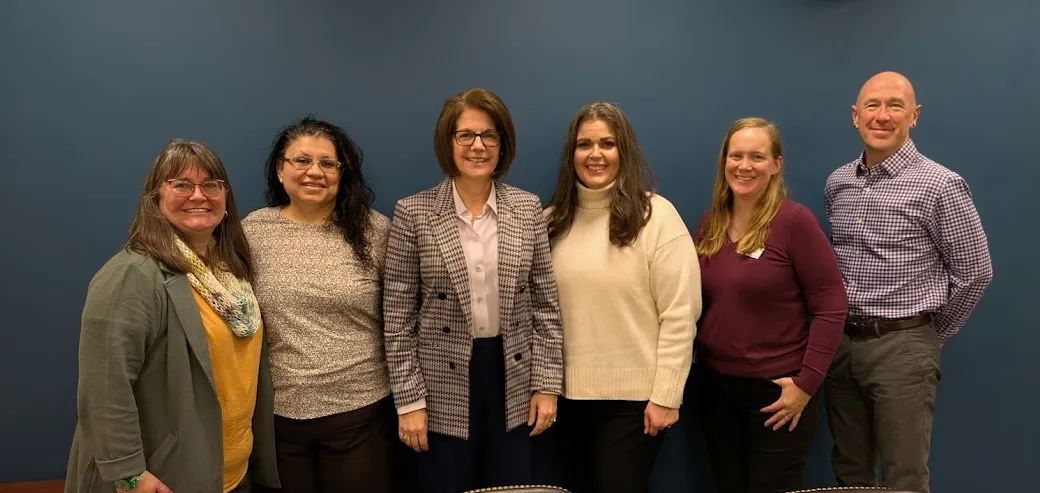
Repealed the Steal (GPO/WEP)
The Social Security Fairness Act, repealed both the Windfall Elimination Provision (WEP) and Government Pension Offset (GPO), which unfairly reduced Social Security Benefits earned by retired public servants like teachers, police officers, firefighters, emergency services personnel, other first responders, and state employees. 2.8 million Americans were impacted by this policy and will see an average increase of $360 per month in their benefits. It was amazing to see the results of 40 years of advocacy. I brought this reminder for each of our representatives to thank them for their vote yes.
Senator Rosen encourages Nevada districts to apply for Community Project Funding requests at this link.
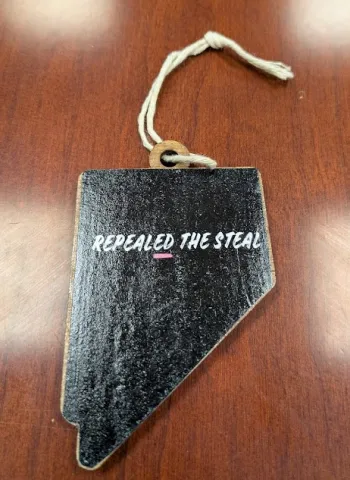
HIGHLIGHTS FROM THE NEA BOARD MEETING
NEA Stories of Impact - Federal Executive Orders - We need details on the impact of the President's Executive Orders. Where special observances have been cancelled, curriculum has been changed, classes cancelled, etc. please share the details with us.
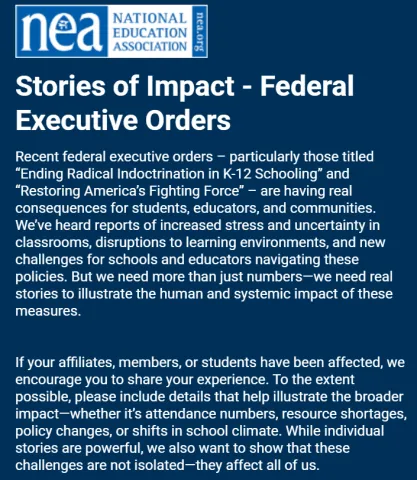
Tom Wellman Remembered
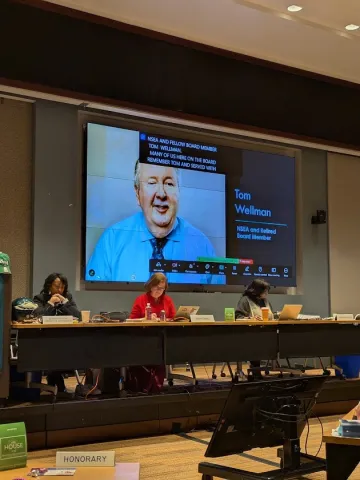
NEA Member Benefits
Member Benefits can offset the cost of membership.
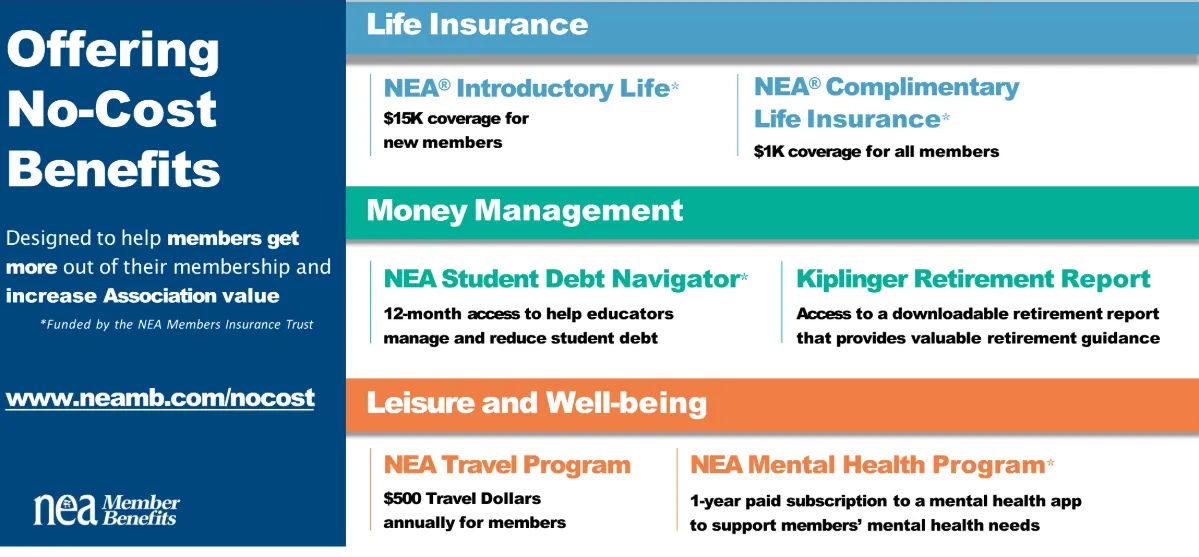
Report of the Secretary-Treasurer
Secretary Treasurer Candelaria always starts his report with Tone and the Top. Candelaria reminded the Board of Directors that being the largest labor union in the country places NEA as a target of detractors. Candelaria shared that an external firm was hired to conduct an internal audit, which will include cybersecurity. Candelaria advertised the NCSEA Financial Forum, which will be held in Minneapolis February 28-March 1. Secretary Candelaria celebrated the second highest new member recruitment since 2015.
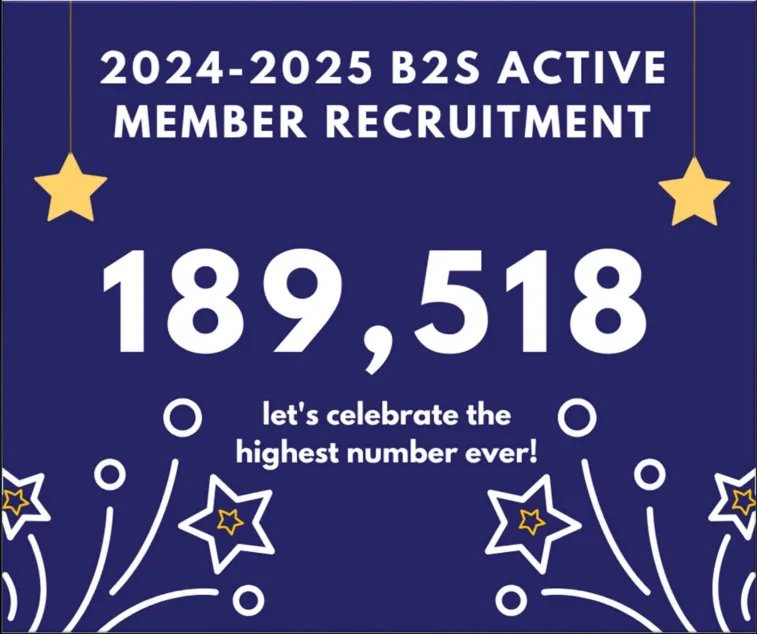
For the first time this year, the ESP Bill of Rights is aligned to the YRO as a Pre-conference.Members can pledge their support at https://www.nea.org/nea-esp-bill-rights. In conjunction with this, Secretary Candelaria highlighted ESP salary wins in Massachusetts, Colorado, Maine, and Delaware.
Secretary Candelaria listed the formal engagements around the budget and listed upcoming engagements. The budget committee recommended no dues increases for Retired and Allies. Secretary Candelaria asked that the board go online to read his entire report. The Strategic goals and vision can be found at nea.org/budget.
May 6, 2024 Report
LOBBY MEETINGS
The first week of May, I engaged in discussions with the staff members of all six federal representatives for Nevada: Susie Lee, Dina Titus, Mark Amodei, Steven Horsford, Jackie Rosen, and Catherine Cortez Masto.
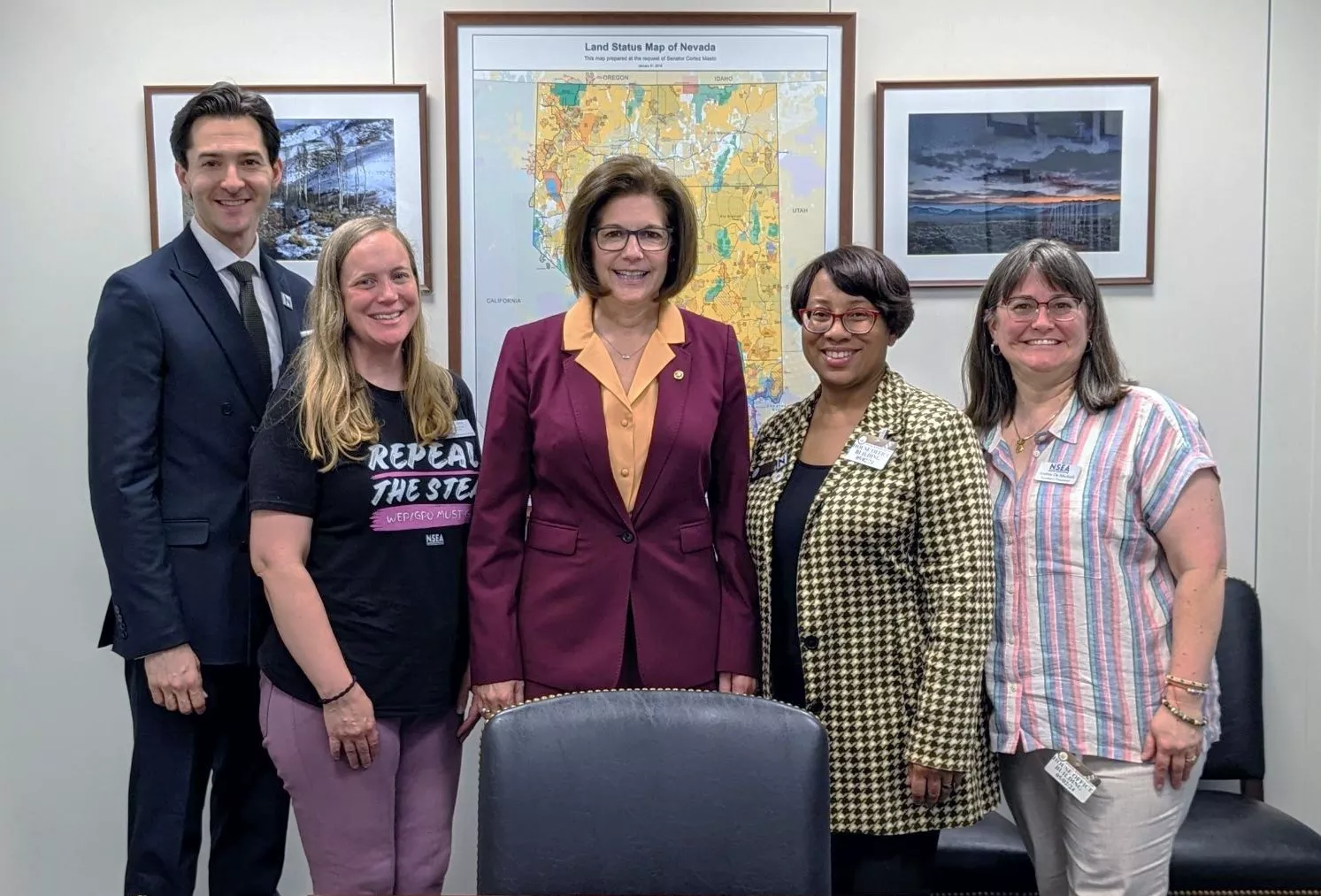
GPO/WEP
A priority issue championed by NSEA is the advocacy for support of the Social Security Fairness Act. There are 14 other states that are impacted by GPO/WEP in addition to Nevada: Alaska, California, Colorado, Connecticut, Georgia, Illinois, Kentucky, Louisiana, Maine, Massachusetts, Missouri, Ohio, Rhode Island, and Texas. The WEP affects about 2.1 million people. It reduces the Social Security retirement, disability, spousal, or survivor benefits of people who work in jobs in which they pay Social Security taxes and jobs in which they do NOT pay Social Security taxes—for example, educators who take part-time or summer jobs to make ends meet. The GPO affects about 746,000 people. It reduces—or eliminates—the Social Security spousal or survivor benefits of people who also get a pension based on federal, state, or local government employment NOT covered by Social Security. Two-thirds of the pension amount is deducted from the Social Security benefit—for someone getting a $1,500 pension, for example, the Social Security benefit is lowered by $1,000. Nearly 70 percent of those affected by the GPO lose their entire spousal or survivor benefit. NEA strongly supports legislation like the bipartisan Social Security Fairness Act (S. 597/H.R. 82), which has 53 cosponsors in the Senate and 318 in the House, and the Social Security 2100 Act (S. 2280/H.R. 4583), which has 4 cosponsors in the Senate and 184 in the House. Both bills fully repeal GPO/WEP.
FMLA
Last year, I brought the issue of the outdated FMLA policies to our representatives. FMLA (The Family Medical Leave Act) contains a concerning provision that negatively impacts our members who have a partner in the same district, limiting them to a combined total of 12 workweeks of leave in a 12 month period for certain FMLA-qualifying reasons. These include the birth or adoption of a child and the care of a parent with a serious health condition. This limitation is harmful to partnered educators working for the same school district, and poses an additional barrier to recruitment and retention of educators at a time when the profession faces a staffing crisis. Senator Catherine Cortez Masto has been interested in doing the work to update FMLA. She has drafted legislation to correct this situation that I brought to her attention. The Senator’s staff is finalizing language, and working to garner bipartisan support. NSEA is continuing to pursue these fixes to FMLA and hopes to see movement on this member driven issue.
IDEA Funding
I raised the concern of the continued lack of funding for IDEA as well as no movement toward fully funding IDEA. Congress passed the Individuals with Disabilities Education Act (IDEA) to make a “free appropriate public education” available to children and young people with disabilities, and to provide special education and related services. Before IDEA, most children and young people with disabilities were isolated in institutions or kept at home, diminishing their opportunities to become independent citizens. Today, more than 60 percent of students with disabilities spend at least 80 percent of their school day in general education classrooms, according to the National Center for Education Statistics. The federal share has never come close to the 40 percent Congress promised to provide—it’s currently less than 13 percent. According to the Congressional Research Service, the IDEA shortfall in the 2021-22 school year was nearly $24 billion. The failure to fund IDEA fully has shifted costs to states and school districts, forcing them to choose between raising taxes, cutting critical services, or diminishing opportunities and programs for all students by redirecting general education funds. NEA strongly supports the IDEA Full Funding Act, which would increase the federal share of IDEA funding to 40 percent over a 10-year period. The bill has 140 cosponsors in the House and 32 in the Senate.
ESP Bill of Rights
Education support professionals (ESPs) transport students, keep schools and grounds safe and clean, prepare and serve healthy meals, provide one-on-one attention, and perform other vital functions that keep schools and campuses running. Despite their importance, many struggle to get by—one-third make $25,000 or less a year and 1 in 10 rely on assistance programs to feed their families. At each of our lobby meetings we asked our representatives to cosponsor bills that recognize these professionals’ centrality to education.
HIGHLIGHTS FROM THE NEA BOARD MEETING
Courses to Support Representative Assembly Delegates
Representative Assembly: July 4-7, Philadelphia Convention Center
Two new courses have been developed for leaders who are elected to serve as delegates to the NEA Annual Meeting and Representative Assembly:
- Course Title: An Introduction to the NEA Representative Assembly: A Course for Delegate Leaders, Part One
- Course Title: An Introduction to the NEA Representative Assembly: A Course for Delegate Leaders, Part Two
These courses provide information, resources, and tools to ensure delegates are prepared to engage in vital debate, set policy, approve the NEA Strategic Plan and Budget, and chart the direction of NEA business. The courses also explain the democratic processes of the Annual Meeting and expound on delegate responsibilities. The courses are accessible and free for members and staff. To enroll, visit www.nea.org/pep.
Secretary-Treasurer Report
NEA Secretary-Treasurer Noel Candelaria began his report with the tone at the top and membership. Candelaria reminded board members that the number one reason why potential members haven’t joined yet is that they haven’t been asked. He reminded the board that NEA has an allied membership category. If you have a friend or colleague who is a community ally to public education, you can invite them to join the movement. They can sign up here.
The budget committee conducted an unprecedented number of engagements across the country over the last year. Candelaria emphasized that these engagements are so important because they invest the membership in the work of NEA. The common threads that came from the 17 budget engagements were:
- Mental and social emotional health
- Want and need for more training
- Safety for educators and students
- Member retention and empowerment
- Educators salaries/wages and benefits
- More political power - federal, state and local
- Community involvement
- RESPECT for the profession
Each objective of the strategic plan was highlighted by members of the budget committee as part of the 2024-2026 Strategic Plan and Budget, which the board unanimously moved to recommend to the Representative Assembly as presented.
Vice President Report
NEA Vice President Princess Moss reviewed the work of Think Tanks over the past year highlighting the fact that Think Tanks were created for visioning work, which can be difficult because it doesn’t result in a product. Moss explained that the Board of Directors will continue to use Think Tanks as a container for dialogue, however the topics for next year have not yet been determined and asked for patience as next year’s topics are developed.
Moss introduced the Educators for Biden Launch and shared that future Educators for Biden events are being planned. Moss cautioned that 2024 will be an extremely close election and every vote is needed. Moss pointed out that although there is a national election, we need to pay close attention to make sure we are electing friends of education. Moss shared a variety of resources available to share with members about the importance of voting. She asked that board members reference the handouts using the QR codes.
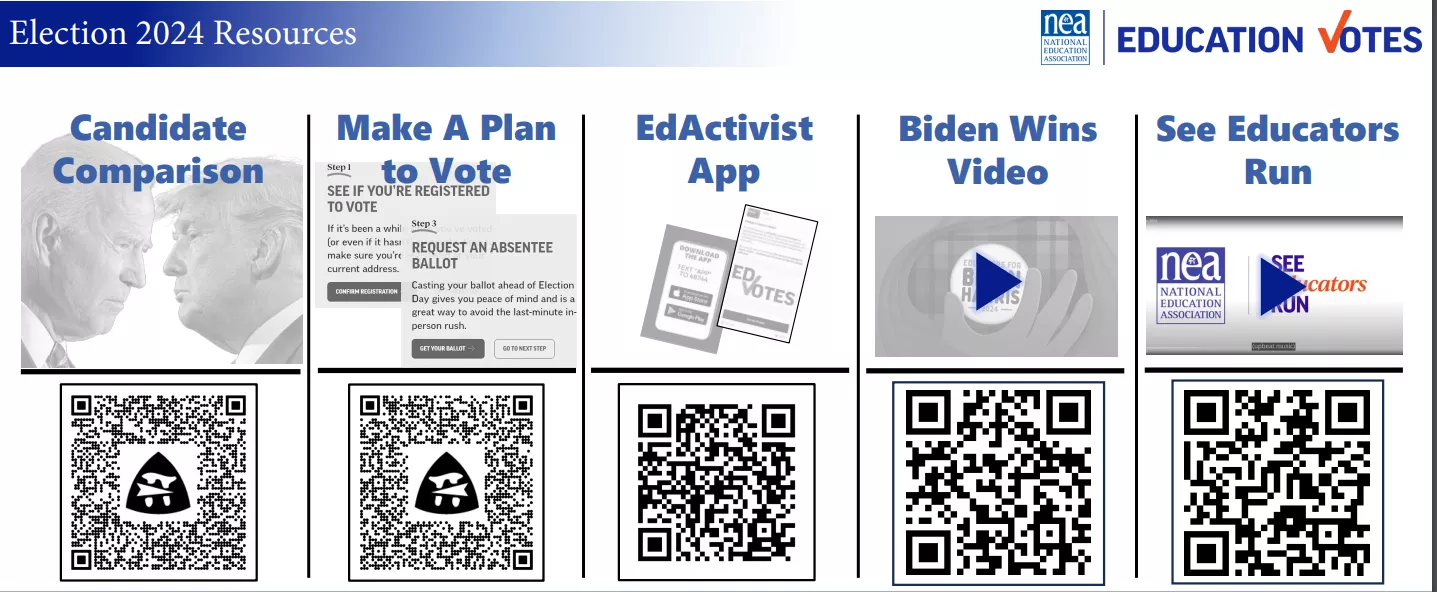
April 19, 2024 Newsletter
February 25, 2024 Report
LOBBY MEETINGS
The first week of February, I engaged in discussions with the staff members of all six federal representatives for Nevada: Susie Lee, Dina Titus, Mark Amodei, Steven Horsford, Jackie Rosen, and Catherine Cortez Masto.
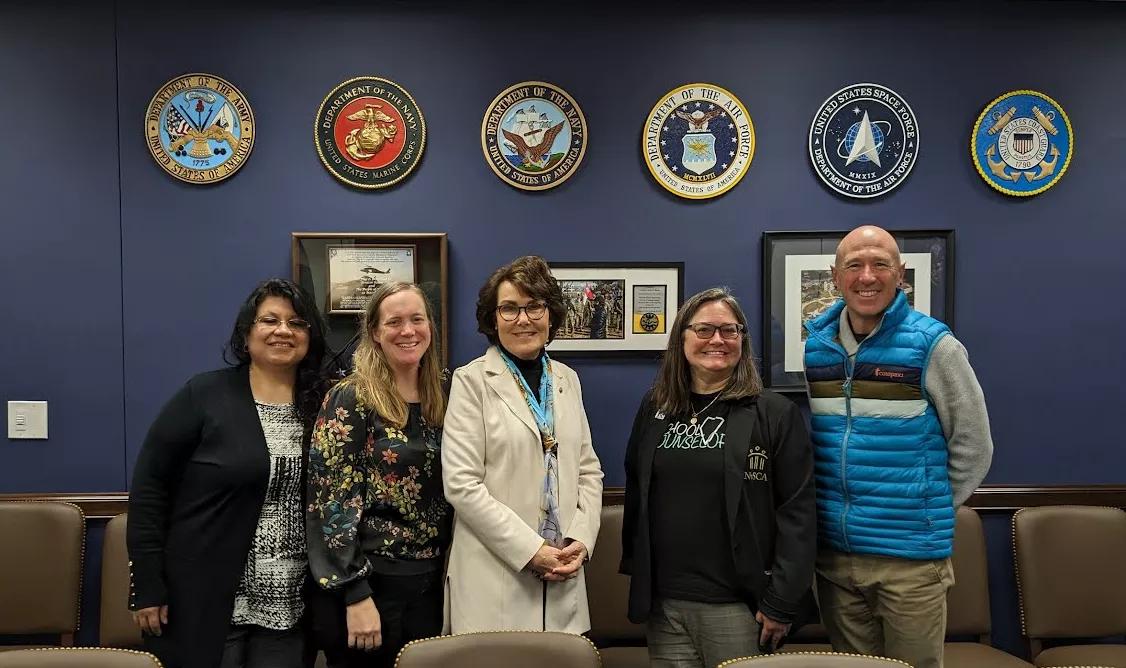
Highlighting of the Work of our Representatives
Susie Lee wanted to share The Partnering Aspiring Teachers with High-Need Schools (PATHS) to Tutor Act she has co-sponsored that would provide meaningful educational opportunities to students and support workforce development by ensuring students in high-need communities receive targeted academic support through intensive, structured tutoring opportunities and would strengthen the pathway of future teachers by placing teacher-candidates into tutoring roles.
Dina Titus reintroduced her Nurses for Under-Resourced Schools Everywhere (NURSE) Act, legislation that would help public elementary and secondary schools hire registered nurses by creating a grant program at the U.S. Department of Education. View Rep. Titus' press release. She also encouraged members in her district to invite her to events.
Mark Amodei highlighted his work with the Pell Grant and community colleges.
Steven Horsford introduced legislation to enhance transparency and consumer empowerment in mental health care. The Mental Health Transparency Act would improve the way mental health services are navigated and accessed in the United States.
Jackie Rosen encourages school districts to submit projects to Community Project Funding. Questions about the process can be directed to [email protected].
Catherine Cortez Masto introduced bipartisan legislation to cut through red tape and make it easier for current and former military servicemembers to access the Public Service Loan Forgiveness (PSLF) program. This program forgives student debt for qualified public servants including teachers, firefighters and military servicemembers.
GPO/WEP
A priority issue championed by NSEA is the advocacy for support of the Social Security Fairness Act. There are 14 other states that are impacted by GPO/WEP in addition to Nevada: Alaska, California, Colorado, Connecticut, Georgia, Illinois, Kentucky, Louisiana, Maine, Massachusetts, Missouri, Ohio, Rhode Island, and Texas. Including this advocacy on the priorities list marks an encouraging step in the direction of repealing the Government Pension Offset (GPO) diminishes or eliminates spousal or survivor benefits for individuals receiving pensions based on government employment not covered by Social Security. The Windfall Elimination Program (WEP), on the other hand, reduces benefits for individuals engaged in both Social Security-taxed and non-Social Security-taxed employment, a scenario frequently encountered by educators who take on part-time or seasonal work. NSEA's continued efforts to press for the repeal of GPO/WEP demonstrate a commitment to rectify these inequitable programs that discourage people from pursuing careers in education.
FMLA
Last year, I brought the issue of the outdated FMLA policies to our representatives. FMLA (The Family Medical Leave Act) contains a concerning provision that negatively impacts our members who have a partner in the same district, limiting them to a combined total of 12 workweeks of leave in a 12 month period for certain FMLA-qualifying reasons. These include the birth or adoption of a child and the care of a parent with a serious health condition. This limitation is harmful to partnered educators working for the same school district, and poses an additional barrier to recruitment and retention of educators at a time when the profession faces a staffing crisis. Senator Catherine Cortez Masto has been interested in doing the work to update FMLA. She has drafted legislation to correct this situation that I brought to her attention. The Senator’s staff is finalizing language, and working to garner bipartisan support. NSEA is continuing to pursue these fixes to FMLA and hopes to see movement on this member driven issue.
IDEA Funding
I raised the concern of the continued lack of funding for IDEA as well as no movement toward fully funding IDEA. At this time, IDEA has only ever been funded at 40%. Five out of the 6 state representatives agreed with NSEA’s concerns on IDEA funding. Education staff for both Senators assured NSEA that IDEA funding is constantly on their front burner. With the lobby team, I attempted to frame the conversation around the bipartisan support of expansion of the child tax credit and that children would benefit just as much from a fully funded IDEA. Both are just as important and should have the same bipartisan support. It was discussed that too many Republican members continue to refuse to hold any discussion around public funding for public schools. I will continue to keep IDEA as part of the agenda items at my next visit in May.
ESP Bill of Rights
Education support professionals (ESPs) transport students, keep schools and grounds safe and clean, prepare and serve healthy meals, provide one-on-one attention, and perform other vital functions that keep schools and campuses running. Despite their importance, many struggle to get by—one-third make $25,000 or less a year and 1 in 10 rely on assistance programs to feed their families. At each of our lobby meetings we asked our representatives to cosponsor bills that recognize these professionals’ centrality to education.
Rural Schools Reauthorization Act
After hearing from several of our locals in rural areas, I took those concerns to our representatives, giving them information on the Secure Rural Schools and Community Self Determination Act, which would be a game changer for rural communities. Counties can use these funds in various ways, including to support their schools, students, and educators. I reminded our representatives that rural students in Nevada deserve what all students deserve: access to a well-rounded education that inspires them, sparks their curiosity, and prepares them for the future. While the educator shortage is critical in most communities, it is especially dire in Nevada’s rural areas, partly because schools lack the salaries and working conditions that help attract and retain teachers, education support professionals, and other school employees. The Secure Rural Schools program helps counties and their schools support the entire school, including all education professionals and the related school and county infrastructure. Without an extension students as well as the communities in which they live would be harmed. As it stands, the last payment under the program will be sent in approximately April 2024.
HIGHLIGHTS FROM THE NEA BOARD MEETING
Mary Hatwood Futrell Archives Gallery Dedication
Since its inception in 1857, The NEA has amassed a vast collection of archives: firsthand data, photos, notes, meeting minutes, letters, and other primary sources. These archives tell our stories and provide many lessons that can shape our journey as we move forward. NEA, acknowledging the importance of displaying our rich history, lent its full support to establishing a permanent archives gallery. The gallery displays NEA’s contributions to public education, women’s rights, the civil rights movement, the rights of underserved populations, our country, and our global education family. NEA dedicated the Mary Hatwood Futrell Archives Gallery to the past president Mary Hatwood Futrell (1983-89) and the first president of Education International, a global union federation of teachers’ trade unions. Mary, who was highlighted in the first archive exhibit, remains a living legacy of all that NEA represents.
Vice President Report
NEA Vice President Princess Moss brought forth an action item to revise the GPS Fund Grant Guidelines which had not been updated since 2020. During her report, Moss spoke passionately on the importance of elections asking that the board be all in on the efforts to elect Joe Biden. She cautioned that sitting on the couch is a vote for Trump. Moss shared 2024 Election resource tools that can be seen in the QR codes below. As part of the elections update, Moss stressed the importance of Political Action Committee (PAC) giving, sharing the importance of supporting candidates with early money. Moss encouraged directors to sign up for a continuous credit card contribution of $3 or more. Moss gave a call to action for directors to recruit for See Educators Run, create a plan to share the Biden Wins video, engage networks through the EdActivist App, and encouraged storytelling as a recruitment tool.

Action Items
- 2024 NEA Friend of Education Award Winner - American Library Association
- 2024-2025 Fiscal year membership dues
- GPS Fund Grant Guidelines Revised
- NEA Executive Committee Action Item on a call for a ceasefire between Israel and Hamas
In an effort to represent your concerns effectively, I engaged with the NSEA Board of Directors to identify key issues that are currently on members’ minds. These issues included educator shortages, recruitment and retention of staff in rural areas, and a living and thriving wage for Education Support Professionals. I encourage all stakeholders to reach out to me at [email protected] if there are additional issues you wish to have conveyed to our state representatives. It is an honor to serve as a strong advocate for the schools of Nevada.
October 2, 2023 Report
INTRODUCTION
My name is Rachel Croft, and I am the elected NEA Director who lobbies for Nevada students, Education Support Professionals (ESPs), and teachers in Washington D.C.. In that role, I also sit on the NEA Board of Directors. I am excited to share information about the recent NEA Board meeting and the meetings with our state representatives: Congressman Horsford (CD4), Congressman Amodei (CD2), Congresswoman Titus (CD1), Congresswoman Lee (CD3), Senator Rosen, and Senator Cortez Masto. I ask that you share this update with your membership.
LOBBY MEETINGS
During the month of September, I engaged in discussions with the staff members of all six state representatives. Notably, Senator Catherine Cortez Masto and Representative Susie Lee accommodated schedule adjustments to engage in face-to-face meetings, affording them the opportunity to hear first-hand the concerns of educators in Nevada. Several state representatives also brought forth specific initiatives they wished to highlight. Congressman Horsford shared his work in the leadership of the Congressional Black Caucus taking place in Washington DC during our visit. Congresswoman Titus expressed her desire to inform Nevada schools about the Library of Congress Surplus Books Program application, available at Library of Congress Surplus Books Program Application. Senator Rosen emphasized her involvement with initiatives such as Girls in STEM and the Grow Your Own Educator programs. In an effort to represent your concerns effectively, I engaged with the NSEA Board of Directors to identify key issues that are currently on members’ minds. These issues included educator shortages, student testing, inflation, and rising medical costs. I encourage all stakeholders to reach out to me at [email protected] if there are additional issues you wish to have conveyed to our state representatives. It is an honor to serve as a strong advocate for the public schools of Nevada.
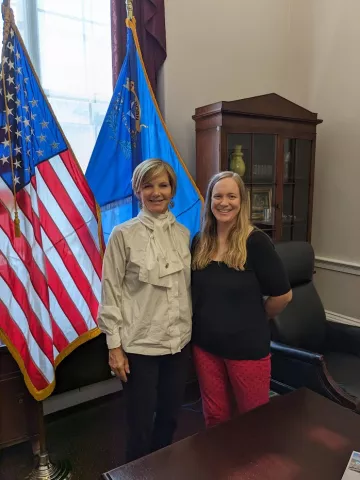
GPO/WEP
A priority issue championed by NEA is the advocacy for support of the Social Security Fairness Act. Including this advocacy on the priorities list marks an encouraging step in the direction of repealing the Government Pension Offset (GPO) and the Windfall Elimination Program (WEP). GPO diminishes or eliminates spousal or survivor benefits for individuals receiving pensions based on government employment not covered by Social Security. The WEP, on the other hand, reduces benefits for individuals engaged in both Social Security-taxed and non-Social Security-taxed employment, a scenario frequently encountered by educators who take on part-time or seasonal work. NEA's continued efforts to press for the repeal of GPO/WEP demonstrate a commitment to rectify these inequitable programs that discourage people from pursuing careers in education.
BUDGET
A second concerning issue was the GOP proposal from the House Appropriations Labor, Health and Human Services, Education Subcommittee which would cut funding for Title 1 programs, block meaningful reform of federal student debt programs, and result in higher class sizes.
FMLA
Starting in 2022, I began bringing up FMLA to our representatives. FMLA (The Family Medical Leave Act) contains a concerning provision that negatively impacts our members who have a partner in the same district, limiting them to a combined total of 12 workweeks of leave in a 12-month period for certain FMLA-qualifying reasons. These include the birth or adoption of a child and the care of a parent with a serious health condition. This limitation is harmful to partnered educators working for the same school district and poses an additional barrier to the recruitment and retention of educators at a time when the profession faces a staffing crisis. For example, if a new educator has a baby and both parents work in the same district, they must split their parental leave instead of each parent receiving leave. Another example that was shared with me was when one member took FMLA due to a medical issue. Later that school year, his partner had a death in the family, but their shared FMLA leave had already been used and there were no days left for his partner. Senator Catherine Cortez Masto shared with me that she will be introducing a bill to correct this situation that I brought to her attention. Her staff has drafted legislation that they have shared with NEA. NEA policy teams agreed that this legislation would fix this issue for educators. The Senator’s staff is finalizing language, and anticipating introducing the legislation sometime in October (the anticipated government shutdown could impact this timeline). As we pursue these fixes to FMLA, they are part of our larger strategy of working with our allies for paid leave for all and other legislation that improves FMLA for all workers.
BOARD MEETING UPDATES
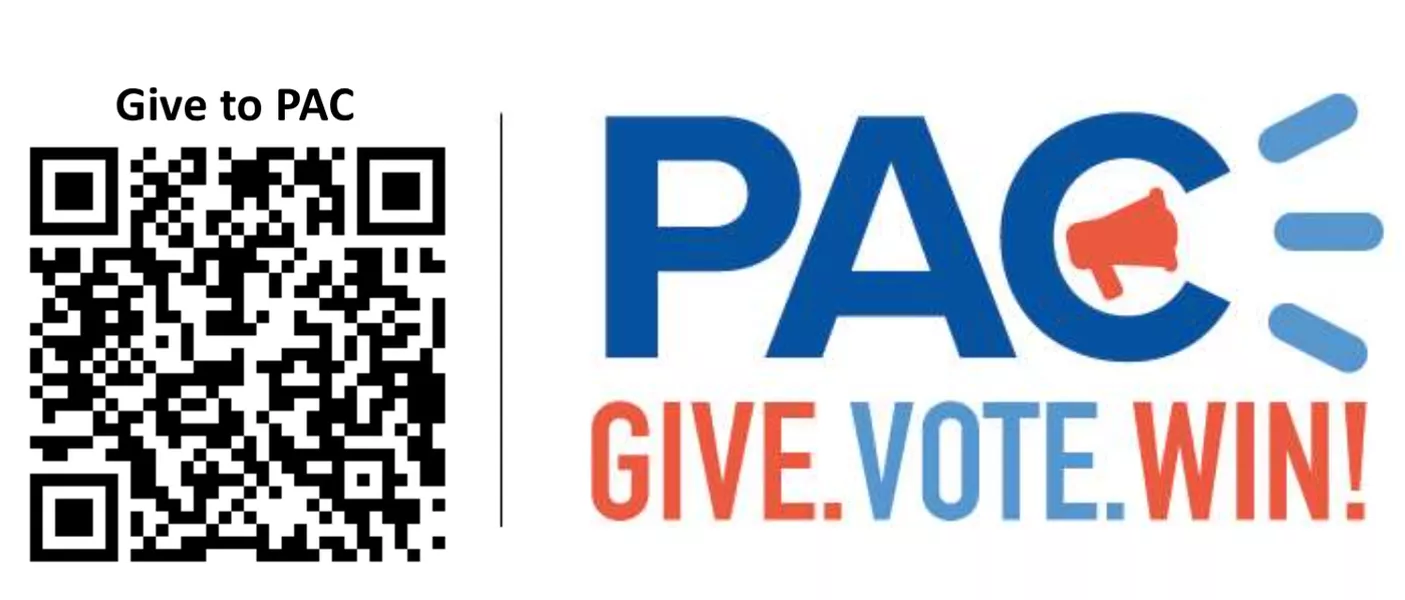
RA News
In response to the 2023 Representative Assembly, NEA President Becky Pringle shared with Directors that she intends to create explicit rules for Bylaw 3-5 Meetings: Location (“No meeting shall be held in any location where any delegates are likely to experience discriminatory treatment.”) to guide the RA planning committee. The committee will review laws in locations already planned and deliver a report for potential action at the February 2024 Board of Directors’ meeting. In keeping with the goal to engage RA Delegates for the entire year they are elected, tentative virtual convenings are planned for December 4 and April 17. Delegates will also have opportunities to engage earlier and more deeply with the next cycle of the Strategic Plan and Budget. President Pringle said the goal is to fully educate delegates on the contents of the budget, with multiple opportunities for input, so they will be ready for action regarding the budget upon arrival to the 2024 Representative Assembly in Philadelphia.
Secretary-Treasurer Update
Secretary Candelaria highlighted an NEA book club that will be open to 100 member registrants that will center diverse disability awareness with a curriculum that will roll out in early 2024. Check back here in October for more details. Candelaria shared that NEA is facing a tight budget year due to the impact of the loss of payroll deduction in some states. He lifted up Kentucky and the work the state did to protect membership through a member-to-member AutoPay “Flip” Campaign. Candelaria noted that 46 states participated in early enrollment, which provides a strong foundation to begin the membership year. NEA currently has three lawsuits challenging anti-payroll deduction laws. NEA won its litigation in Kentucky, while losing a case in Tennessee. Tennessee Education Association is committed to converting 100% of their members to other methods of payment. NEA has been ruled against in Florida; however, it has multiple other lawsuits there and is still committed to fight for Florida educators’ right to payroll deduction. Candelaria shared the charges of the Artificial Intelligence (AI) Task Force, which will focus on shaping the future of AI policies and practices. He emphasized the need to be at the forefront of determining policy, reducing bias, and improving cybersecurity. NEA President Becky Pringle explained her plan to utilize members who are currently engaging in this work as she finalizes this task force. She urged the board to learn alongside the task force and commit to actively engaging in AI-related resources that are posted to EdCommunities.
Executive Committee Update
President Becky Pringle introduced the Executive Committee. Executive Committee member Christine Sampson-Clark moved approval of 20 million dollars from the Ballot Measure/Legislative Crisis Fund for behind-the-wall activities in order to counter attacks on public education and to support measures and initiatives that help educators and students. Executive Committee member Shannon McCann spoke in support of the measure and explained to board members the importance of these activities in promoting pro-public education policies. Motion was approved by the board. The NEA Executive Committee Members presented the Strategic Objectives of the framework, noting that the previous objective of “Enhance Professional Organizational Regard” had been replaced with the objective of “Improve Professional Respect and High-Quality Working Conditions.” Other notable changes are the inclusion of a more unifying message under the objective of “Strengthen Public Education as the Cornerstone of Democracy” and the rewording of the explanation of “Support Professional Excellence and Student Learning” to include not just professional supports, but also educator satisfaction. There is also an increased focus on organizing and racial and social justice throughout the framework.
Resources:
- Donate to the PAC: Give. Vote. Win!
- Collaborating for Student Success: A Comprehensive Guide for Increasing Shared Decision-Making Through Lasting Partnerships
- Nominate a racial justice advocate from your state for the NEA HCR Awards by December 8
- Apply for NEA’s Read Across America 2023-24 State Affiliate Event Grant by October 20
- Donate to educators affected by the Maui wildfires here
- Share Biden-Harris wins
- Library of Congress Surplus Books Program Application
February 23, 2023 Report
Introduction
My name is Rachel Croft, and I am the elected NEA Director who lobbies for Nevada students, Education Support Professionals (ESPs), and teachers in Washington D.C., and sits on the NEA Board of Directors. I am excited to share information about the recent NEA Board meeting and the meetings with our state representatives: Congressman Horsford, Congressman Amodei, Congresswoman Titus, Congresswoman Lee, Senator Rosen, and Senator Cortez Masto. I ask that you share this update with your membership.
Highlights from the NEA Board Meeting
Budget
The NEA Board will vote on the strategic plan and budget in May, and Representative Assembly delegates can provide input and ask questions at the Open Hearing on June 22, 2023. In July, the NEA Board of Directors will recommend the budget to the Representative Assembly, the body that ultimately approves the strategic plan and budget. 2023-2024 dues are based on a formula and play a critical role in the budget. Secretary Candelaria shared information that membership is up compared to the end of last year. Back-to-school recruitment efforts lead to a 20.8% increase in membership as compared to 2021. He emphasized that retention is the key to membership, noting that NEA has lost about 1,500 members in Higher Ed. NEA hosts a website page for state wins on educator voice at www.nea.org/win. Nevada’s page highlights Elections. Across the state, seven NSEA members ran for office in November: five won. Additionally, NSEA members were recognized for being integral in re-electing Senator Catherine Cortez Masto.
Based on the gains in educator pay across the nation, the 2023-2024 dues will go up for Active - Teacher members and Active-ESP members. The NEA Board of Directors approved an increase to the 2023-2024 membership dues.
An additional note on organizing is that NEA is accepting applications for the Organizing Fellowship Academy (NOFA). It is a one-year, full-time release fellowship. NOFA’s primary focus is to train selected members how to be organizers and increase the pipeline for members into UniServ work, with a particular emphasis on assisting states in diversifying their UniServ workforce. If you are interested in more information about this fellowship, please send an email to [email protected]. The application window closes on March 31.
NBI Update
The Executive Committee provided a preliminary update on NBIs. Send an email to [email protected] if you would like to read the report in full.
NBI-A calls for NEA to issue a National Call to Action to ensure that all students, educators, schools, campuses, and communities are safe from gun violence. In early January 2023, NEA hosted an in-person gun violence convening leaders, members, and staff to “create a unified, national set of strategies and tactics at every level of the association that keeps the threat of gun violence to our students and educators at the forefront of policy discussions until we can ensure the safety of our communities.”
Another NBI speaks to GPO/WEP, which is an issue I have been lobbying strongly on since I was elected; I ensure it is added to the agenda for every meeting I have with our state representatives. In my previous Superweek meetings, I was able to ensure that the entire Nevada delegation had signed on to HR 82, a bill to repeal GPO/WEP. In response to this issue, NEA has created a cadre of active and retired members. The cadre met in December 2022 and is planning a Day of Action in Spring 2023 to lobby members of Congress on legislation that would repeal GPO-WEP. I urge you to reach out to your congressional representative and our Senators to let them know what an important issue this remains to us.
Ballot Measure Budget Fund Allocations
I include the Ballot Measure Budget Fund Allocations in my report to ensure the NSEA Board and membership are receiving regular updates on how NEA spends our dues money. This fund allocation supports state affiliates with additional funding to support legislative actions that either supports the passage of beneficial legislation or defend against actions that could harm NEA members. Three proposals were approved:
Kentucky Education Association (KEA) was approved for $380,000 for a positive accountability campaign thanking their Governor for his work to ensure a pay raise for all educators across the state. The support includes replacing non-educators on the Kentucky State Board of Education with educators. The Governor has also worked to use surplus funds from the state budget to increase educator salaries and access to early childhood education.
Massachusetts Teachers Association (MTA) was approved for $500,000 to support investments in the Fair Share Act. The approved funding will allow for member communication in support of these efforts through a digital marketing campaign. The MTA is also working to make sure that a living wage component for ESP members is part of the funding from the Fair Share Act. Some ESPs have received a 40% increase in pay as a result of MTA’s efforts.
NEA-New Mexico was approved for $66,100. NEA-New Mexico has had significant wins, including salary increases and a proposal from the governor to cover 100% of health insurance premiums for all educators.
Lobby Meetings
Our Lobby team was able to meet with the staff of all six state representatives. The priority NEA lobby issues were the debt ceiling, police reform, and community schools. I added GPO/WEP, FMLA, and school violence to this list, as these are all issues that impact schools in Nevada. Congresswoman Lee was able to join in the meeting and was interested in what we had to say about modernizing FMLA as well as our messages about the retention of educators and decreasing school violence. Congressman Horsford met with the team and expressed his appreciation for educators and the work we do in schools. Congressman Horsford is the Labor aide and is interested in our organizing efforts. I’m hoping to make more connections with him in speaking about unionism/education. The team discussed how education is truly an investment in the economic future of our nation and how funding for full Pre-K impacts the economy in the long run. When Senator Cortez Masto joined the team, she was curious about how things were going with the Nevada Democrats and the state legislative session. President Etcheverry stated that NSEA is not at the table and the Senator expressed concern about that, asking several follow up questions and stating that she will be reaching out to the Nevada Democratic Leadership. The team stressed that educators need a strong, fierce voice because we are working with the students of Nevada. Congresswoman Titus was the first to sign on to the GPO/WEP bill HR 82. She is concerned that the bill has fallen to the wayside due to other competing issues such as the debt ceiling. Staff stated that the Congresswoman would look for an opportunity to reintroduce this issue. She also inquired into the state legislative session and I was able to bring to her attention both Time for 20 and Governor Lombardo’s per pupil funding proposition. Congresswoman Titus wanted to share with Nevada schools the Library of Congress Surplus Books Program application at https://www.loc.gov/acq/Surplus_Books_Application.pdf.
After each meeting, I will send a follow-up email reminding the representative of our discussion points. If you have an issue you would like for me to share with our state representatives, please reach out to me at [email protected]. I'm honored to be a strong voice for our students in Nevada.
UCN Rally
During our delegate assembly, I raised money for the NEA PAC by selling red flags for education. A grassroots group at Carson High School is planning a rally for UCN on March 4th. The goal is that every time a legislator walks in or out, or looks out their window, they will be reminded of us and our fight for education! You are invited to attend the rally and to add your red flag for education.
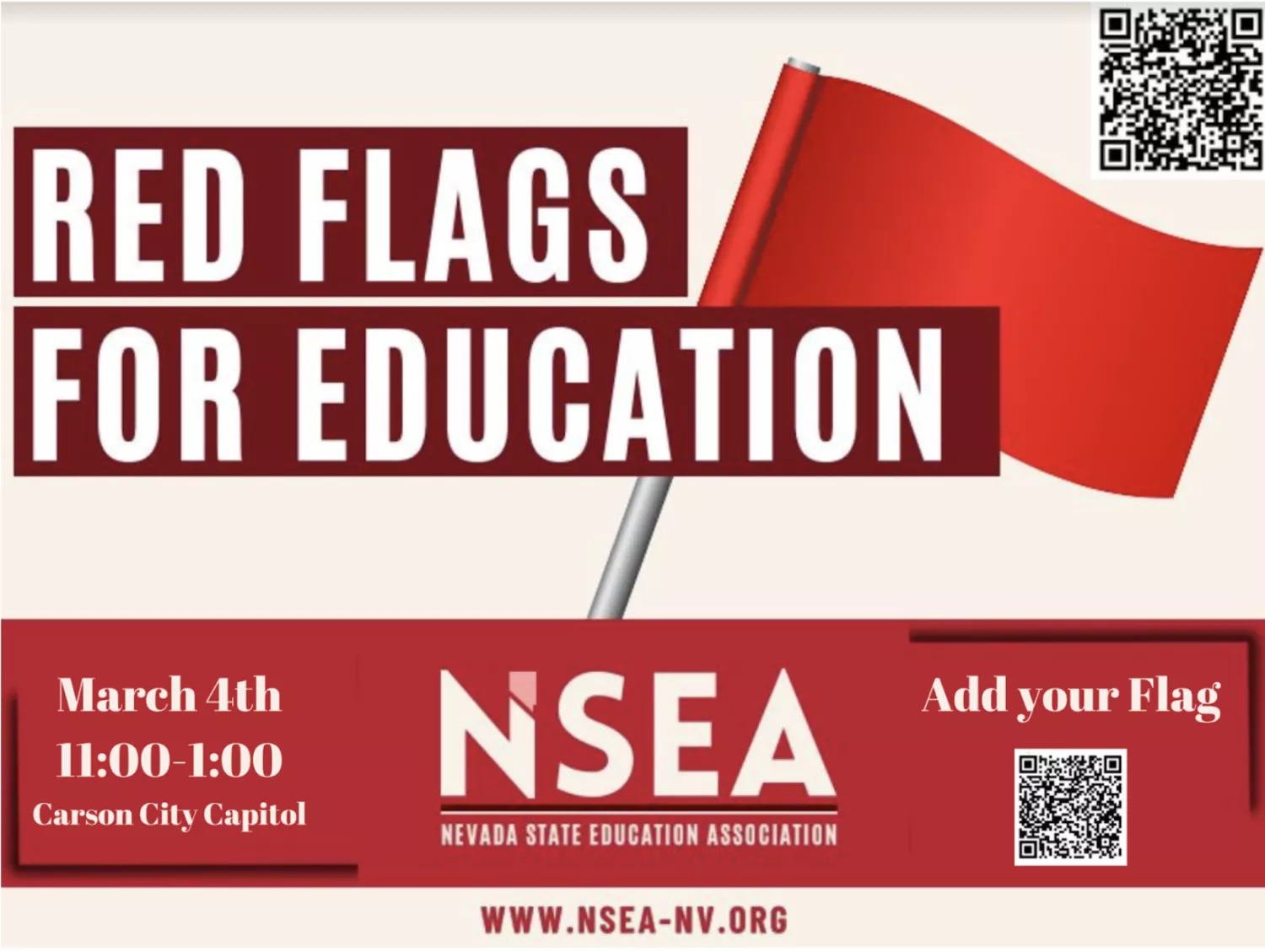
October 23, 2022 Report
INTRODUCTION
My name is Rachel Croft, and I am the elected NEA Director who represents Nevada students, education support professionals (ESPs), and teachers in Washington, D.C. I am excited to share the discussions I had during my recent meetings with our federal delegation: Congresswoman Titus (CD1), Congressman Amodei (CD2), Congresswoman Lee (CD3), Congressman Horsford (CD4), Senator Rosen, and Senator Cortez Masto.
GPO/WEP
On September 22, 2022, I scheduled a full day of meetings on Capitol Hill to meet with our Nevada representatives. As you may know, I have been lobbying for some time on the repeal of GPO/WEP. GPO/WEP are programs that reduce benefits for teachers and ESP's who work a second job or come to education as a second career. After my lobby meeting earlier this year in February, Congresswoman Titus was the first Nevada representative to cosign bill HR 82 (also known as The Social Security Fairness Act) to repeal GPO/WEP. Shortly thereafter, two other Nevada representatives in the House, Rep. Horsford and Rep. Lee, cosigned as well. The only hold out in the Nevada delegation was Congressman Amodei. I met with his staff on Thursday morning, and thoroughly explained the issue, including the impacts on our educator pipeline. A few hours after our meeting, his staffer sent me an email that Congressman Amodei agreed to cosign the bill, meaning that the entire Nevada delegation now supported the GPO/WEP repeal. I feel like my lobbying made that happen! With his cosigning of the bill, there are now approximately 300+ representatives in the House who have signed on, which means there are enough cosigners on the bill that it will go on the consent agenda.
VIOLENCE
In addition to the above GPO/WEP issue, I spent time talking to our representatives about the increased violence in schools and the impact that has on ESP's, teachers, and our students. In each meeting, I told one particular story about an ESP who had recently quit her job because as she said, "My physical well being is worth more than $15 dollars an hour." This led to some very good discussions with our representatives. In particular, Rep. Horsford wanted to discuss the Stronger Connections grant program under the Bipartisan Safer Communities Act (BSCA). This program will provide grants to states in an effort to provide students with safer and healthier learning environments. This grant process is ongoing, as it was just announced in mid-September and it will be something to follow up on in later reports and meetings.
SCHOOL RESCUE FUNDS
Lastly, my meetings also served as an opportunity to update our delegation on American Rescue Plan (ARP) funds, also called “School Rescue” Funds. NSEA Communications Director, Alexander Marks, also serves as the Nevada ARP Coordinator and attended the meetings with me. Marks provided context, information, and statistics on the usage of ARP money in Nevada. He mentioned that a provision in this bill was for districts to “meaningfully” consult with the unions on how to best use these funds. He explained that listening to educators and unions was so important it was literally built in as a requirement, but unfortunately, did not occur in every Nevada district, leading to an inconsistent implementation of this provision. To tie in that point, one of the stories I shared was about how ARP money is meant for infrastructure updates but isn't going as far as it was originally intended. For example, we shared that in Nye County, some school buses do not have air conditioning. This creates a problem when the bus route is over an hour long and the temperature is in triple digits day after day. The school rescue funds were supposed to fund these sorts of upgrades, and yet it has not yet occurred. It is through stories like these that I help our representatives in Washington, D.C. understand the realities of what it’s like to be an educator right now so they feel more connected to us all and can help solve the various issues we face in public education. I believe I accomplished that during my meetings.
If you have an issue or topic you would like for me to share with our elected representatives, please reach out to me. I'm honored to be a strong voice for our students in Nevada.
Rachel Croft, NBCT
NEA Director
Lobby Meetings with Our Delegation
